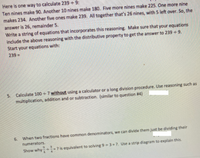
Algebra and Trigonometry (6th Edition)
6th Edition
ISBN: 9780134463216
Author: Robert F. Blitzer
Publisher: PEARSON
expand_more
expand_more
format_list_bulleted
Question

Transcribed Image Text:Here is one way to calculate 239 + 9:
Ten nines make 90. Another 10 nines make 180. Five more nines make 225. One more nine
makes 234. Another five ones make 239. All together that's 26 nines, with 5 left over. So, the
answer is 26, remainder 5.
Write a string of equations that incorporates this reasoning. Make sure that your equations
include the above reasoning with the distributive property to get the answer to 239 +9.
Start your equations with:
239
5. Calculate 100 +7 without using a calculator or a long division procedure. Use reasoning such as
multiplication, addition and or subtraction. (similar to question 4)
6. When two fractions have common denominators, we can divide them just be dividing their
numerators.
Show why+-? is equivalent to solving 9-3=?. Use a strip diagram to explain this
Expert Solution
This question has been solved!
Explore an expertly crafted, step-by-step solution for a thorough understanding of key concepts.
This is a popular solution
Trending nowThis is a popular solution!
Step by stepSolved in 2 steps

Knowledge Booster
Similar questions
- Based on this expression what is the amount of money Paul had remainingarrow_forwardMr. Huang had Y sunflower plants in his garden. George wanted to have a more impressive garden , so he planned twice as many sunflowers as Mr.Huang . He then gave two of his sunflower plants away to his daughter.Write an expression for the number of sunflower plants George now has. Read the statement through,from beginning to the end Read the statement a second time breaking it down into it’s important parts Mr.Huang ‘s flowers = George’s flowers = Number given away to the daughter = Translate/organize the partsarrow_forwardIf = 27- 67 + 2k and ỹ = 7+7-k, determine + 25. 6.arrow_forward
Recommended textbooks for you
 Algebra and Trigonometry (6th Edition)AlgebraISBN:9780134463216Author:Robert F. BlitzerPublisher:PEARSON
Algebra and Trigonometry (6th Edition)AlgebraISBN:9780134463216Author:Robert F. BlitzerPublisher:PEARSON Contemporary Abstract AlgebraAlgebraISBN:9781305657960Author:Joseph GallianPublisher:Cengage Learning
Contemporary Abstract AlgebraAlgebraISBN:9781305657960Author:Joseph GallianPublisher:Cengage Learning Linear Algebra: A Modern IntroductionAlgebraISBN:9781285463247Author:David PoolePublisher:Cengage Learning
Linear Algebra: A Modern IntroductionAlgebraISBN:9781285463247Author:David PoolePublisher:Cengage Learning Algebra And Trigonometry (11th Edition)AlgebraISBN:9780135163078Author:Michael SullivanPublisher:PEARSON
Algebra And Trigonometry (11th Edition)AlgebraISBN:9780135163078Author:Michael SullivanPublisher:PEARSON Introduction to Linear Algebra, Fifth EditionAlgebraISBN:9780980232776Author:Gilbert StrangPublisher:Wellesley-Cambridge Press
Introduction to Linear Algebra, Fifth EditionAlgebraISBN:9780980232776Author:Gilbert StrangPublisher:Wellesley-Cambridge Press College Algebra (Collegiate Math)AlgebraISBN:9780077836344Author:Julie Miller, Donna GerkenPublisher:McGraw-Hill Education
College Algebra (Collegiate Math)AlgebraISBN:9780077836344Author:Julie Miller, Donna GerkenPublisher:McGraw-Hill Education

Algebra and Trigonometry (6th Edition)
Algebra
ISBN:9780134463216
Author:Robert F. Blitzer
Publisher:PEARSON

Contemporary Abstract Algebra
Algebra
ISBN:9781305657960
Author:Joseph Gallian
Publisher:Cengage Learning

Linear Algebra: A Modern Introduction
Algebra
ISBN:9781285463247
Author:David Poole
Publisher:Cengage Learning

Algebra And Trigonometry (11th Edition)
Algebra
ISBN:9780135163078
Author:Michael Sullivan
Publisher:PEARSON

Introduction to Linear Algebra, Fifth Edition
Algebra
ISBN:9780980232776
Author:Gilbert Strang
Publisher:Wellesley-Cambridge Press

College Algebra (Collegiate Math)
Algebra
ISBN:9780077836344
Author:Julie Miller, Donna Gerken
Publisher:McGraw-Hill Education